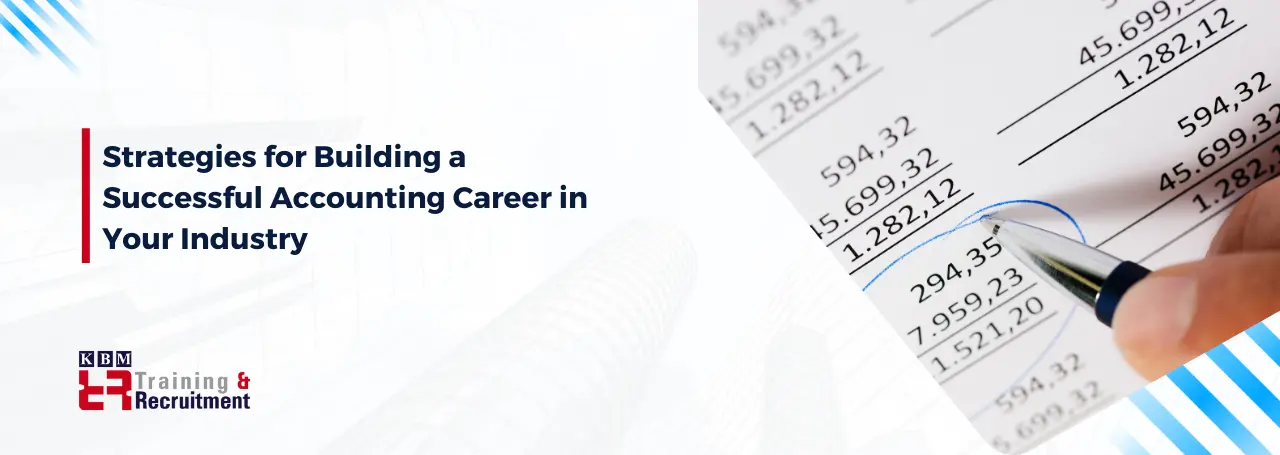Embarking on a career in accounting offers a pathway to a dynamic and rewarding professional journey. As the financial landscape evolves, so do the opportunities and challenges within the accounting industry. This blog will explore critical strategies for building a successful accounting career, from the early stages of education and professional development to ongoing growth and advancement.
1. Invest in Education and Continuous Learning
- Formal Education: Begin your journey with a solid educational foundation. Pursue a relevant degree in accounting, finance, or a related field. A solid academic background serves as the cornerstone of your accounting career.
- Professional Certifications: Consider acquiring professional certifications such as the Certified Public Accountant (CPA), Chartered Global Management Accountant (CGMA), Association of Accounting Technicians (AAT) or Certified Management Accountant (CMA). These certifications enhance your skills and elevate your credibility in the industry.
- Lifelong Learning: Stay abreast of industry trends, regulations, and technological advancements. Engage in ongoing learning through workshops, seminars, and online resources. A commitment to lifelong education ensures that your skills remain relevant in a rapidly changing financial landscape.
2. Gain Practical Experience Through Internships
- Internship Opportunities: Seek internships or entry-level positions to gain hands-on experience. Practical work allows you to apply theoretical knowledge to real-world scenarios, develop problem-solving skills, and build a network within the industry.
- Networking: Forge connections with professionals in your internship or workplace. Networking provides insights into the industry, opens doors to mentorship opportunities, and can lead to valuable recommendations for future career advancements.
3. Develop Strong Analytical and Technical Skills
- Analytical Skills: Accountants must possess strong analytical skills to interpret finances, identify trends, and make informed decisions. Hone your analytical abilities by regularly engaging in financial analysis exercises and case studies.
- Technical Proficiency: Mastering accounting software and tools is crucial. Stay proficient in industry-standard software such as QuickBooks, Excel, and other accounting systems. Technical expertise enhances your efficiency and effectiveness in performing accounting tasks.
4. Cultivate Effective Communication Skills
- Written Communication: Develop clear and concise written communication skills. Accountants must often provide complex financial information understandably: practice writing reports, emails, and summaries to enhance communication proficiency.
- Verbal Communication: Effective verbal communication is essential for collaboration and client interactions. Practice articulating financial concepts, discussing reports, and presenting findings. Strong communication skills contribute to successful client relationships and teamwork.
5. Embrace Ethical Practices and Integrity
- Professional Ethics: Maintain the highest standards of professional ethics. Adherence to ethical practices builds trust with clients, colleagues, and stakeholders. Uphold integrity in financial reporting, decision-making, and interactions within the accounting community.
- Code of Conduct: Familiarise yourself with the professional code of conduct relevant to your certifications. Commit to ethical behaviour, confidentiality, and transparency in all aspects of your accounting career.
6. Specialise and Diversify Your Skill Set
- Specialisation: Consider specialising in a specific area of accounting, such as forensic accounting, tax accounting, or audit. Specialisation enhances your expertise in a niche area, making you a valuable asset in the industry.
- Diversification: While specialising is beneficial, having a broad skill set is equally important. Diversify your skills to adapt to evolving industry needs. This may include learning about new regulations, taxation laws, or emerging technologies that impact the accounting profession.
7. Build a Strong Professional Brand
- Online Presence: Create and maintain a professional online presence. Develop a LinkedIn profile highlighting your education, certifications, skills, and work experience. Participate in relevant online forums and discussions to showcase your expertise.
- Networking Events: Attend industry conferences, workshops, and networking events. Building a solid professional brand involves establishing a positive reputation within the accounting community. Actively engage with peers, mentors, and potential employers to expand your network.
8. Seek Mentorship and Career Guidance
- Mentorship: Find a mentor within the accounting field. A mentor can provide guidance and share insights from their experiences. It offers valuable advice on career decisions. A mentorship relationship fosters personal and professional growth.
- Career Guidance: Seek career guidance from professionals who have successfully navigated the accounting industry. Understand the career paths available within your specialisation and gather insights on potential opportunities for advancement.
9. Stay Adaptable and Embrace Technological Advances
- Technological Adaptability: The accounting landscape is undergoing rapid technological changes. Stay adaptable by embracing new accounting software, automation tools, and emerging technologies. Technical proficiency enhances efficiency and positions you as a forward-thinking professional.
- Continuous Technological Education: Allocate time for constant education on technological advancements in accounting. Participate in workshops, webinars, events, and training sessions to remain updated on the latest tools and software solutions shaping the future of accounting.
10. Pursue Career Advancement Opportunities
- Professional Development: Seize opportunities for professional growth by participating in seminars, workshops, and conferences to broaden your expertise and skills. As you advance in your career, contemplate pursuing advanced degrees or certifications to enhance your qualifications further.
- Leadership Roles: As you gain experience, actively seek leadership roles within your organisation or industry associations. Leadership positions provide opportunities to influence decision-making, contribute to strategic planning, and shape the direction of your career.
Conclusion
Building a successful accounting career requires a strategic and multifaceted approach. Each step contributes to a robust professional journey from educational foundations to continuous learning, practical experience, and personal development. Embrace these strategies, stay adaptable, and cultivate a mindset of lifelong learning to navigate the ever-evolving landscape of the accounting industry. You can forge a fulfilling and influential career in accounting through dedication, ethical practices, and a steadfast commitment to excellence.






















